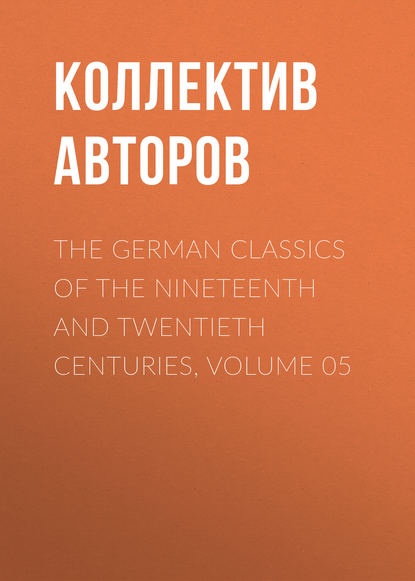По всем вопросам обращайтесь на: info@litportal.ru
(©) 2003-2024.
✖
The German Classics of the Nineteenth and Twentieth Centuries, Volume 05
Настройки чтения
Размер шрифта
Высота строк
Поля
All at once some one behind me tapped me on the shoulder. It was the reverend gentleman, who had laid aside his book, and had been listening to me for a while. "Aha," he said laughing, "aha, my young ludi magister is forgetting to eat and drink!" Whereupon he bade me put away my fiddle and take a bit of luncheon with him, and he then led me to a pleasant little arbor which the boatmen had erected in the centre of the boat out of young birches and firs. He had a table placed beneath it, and I and the students, and even the young girl, were invited to sit down around it upon the casks and packages.
The reverend gentleman now produced cold meat and bread and butter, which had all been carefully wrapped in paper, and took from a case several bottles of wine and a silver goblet, gilt inside, which he filled, tasted first himself, then smelled, tasted again, and finally presented to each of us in turn. The students sat bolt upright on their casks, and only sipped a little, so great was their awe. The girl, too, just dipped her little beak in the goblet, glancing shyly first at me and then at the students; but the oftener she looked at us the bolder she grew.
At last she informed the reverend gentleman that she was leaving her home for the first time, to go into service at a certain castle, and as she spoke I blushed all over, for the castle she mentioned was that of the Lady fair. "Then she is my future lady's maid!" I thought, staring at her, and feeling almost giddy. "There is soon to be a grand wedding at the castle," said his reverence. "Yes," replied the girl, who would have liked to learn more of the matter; "they say it is an old secret attachment, but that the Countess could never be brought to give her consent." His reverence replied only by "hm! hm!" refilling his goblet, and sipping from it with a thoughtful air. I leaned forward with both elbows on the table, that I might lose no word of the conversation. His reverence observed it. "Let me tell you," he began again, "that both Countesses sent me forth to discover whether the bridegroom be not in the country hereabouts. A lady wrote from Rome that he left there some time ago." When he began about the lady in Rome I blushed again. "Is your reverence acquainted with the bridegroom?" I asked, in confusion. "No," replied the old gentleman; "but they say he is a gay bird." "Oh, yes," said I, hastily, "a bird that escapes as soon as it can from every cage, and sings gaily when it regains its freedom." "And wanders about in foreign countries," the old gentleman continued, composedly, "goes everywhere at night, and sleeps on door-steps in the daytime." That vexed me extremely. "Reverend sir," I exclaimed, with some heat, "you have been falsely informed. The bridegroom is a slender, moral, promising youth, who has been living in luxury in an old castle in Italy, and has associated solely with Countesses, famous painters, and lady's-maids, who knows perfectly well how to take care of his money, if he had any, who—" "Come, come, I had no idea that you knew him so well," the divine here interrupted me, laughing so heartily that he grew quite purple in the face and the tears rolled down his cheeks. "But I heard," the girl interposed, "that the bridegroom was a stout, very wealthy gentleman." "Good heavens, yes, yes, to be sure! Confusion worse confounded!" exclaimed his reverence, laughing so that it brought on a fit of coughing. When he had somewhat recovered himself, he raised his goblet aloft and cried, "Here's to the bridal pair!" I did not know what to make of the reverend gentleman and his talk, and I was ashamed, because of my adventures in Rome, to tell him here before all these people that I myself was the missing thrice happy bridegroom.
The goblet kept passing from hand to hand; the reverend gentleman had a kind word for every one, so that all liked him, and finally the entire company chatted gaily together. The students grew more and more loquacious, recounting their experiences in the mountains, and at last brought out their instruments and played away merrily. The cool breeze from the water sighed through the leaves of the arbor, the afternoon sun gilded the woods and vales which flew past us, while the shores echoed back the notes of the horn. And when the reverend gentleman, stimulated by the music, grew more and more genial, and told us stories of his youth, how in vacation-time he too had wandered over hills and dales, and had been often hungry and thirsty, but always happy, and how, in fact, a student's whole life, from its first day in the narrow, dry lecture-room to its last, is one long vacation, then the students drank all around once more, and struck up a song, that reechoed among the distant mountains
"The birds are southward winging
Their yearly, airy flight,
And roving lads are swinging
Their caps in morning's light;
We students thus are going,
And, when the gates are nigh,
Our trumpets shall be blowing,
In token of good-bye.
A long farewell we give thee,
O Prague, for we must leave thee,
Et habeat bonam pacem,
Qui sedet post fornacem!
"When through the towns we're going
At night, the windows shine,
Behind their curtains showing
Full many a damsel fine.
We play at many a gate-way,
And when our throats are dry
We call mine host, and straightway
He treats us generously;
And o'er a goblet foaming
We rest awhile from roaming.
Venit ex sua domo—
Beatus ille homo!
"When roaming through the forest
Cold Boreas whistles shrill,
'Tis then our need is sorest;
Wet through on plain and hill,
Our cloaks the winds are tearing,
Our shoes are worn and old,
Still playing, onward faring,
In spite of rain and cold.
Beatus ille homo
Qui sedet in sua domo
Et sedet post fornacem,
Et habeat bonam pacem!"
I, the captain, and the girl, although we did not understand Latin, joined gaily in the last lines of each verse; but I was the gayest of all, for I had caught a glimpse in the distance of my toll-house, and soon afterward the castle shone among the trees in the light of the setting sun.
CHAPTER X
The boat touched the shore, and we all left it as quickly as possible, and scattered about in the meadows, like birds suddenly set free from the cage. The reverend gentleman took a hasty leave of us, and strode off toward the castle. The students repaired to a retired dingle, where they could shake out their cloaks, wash themselves in the brook, and shave one another. The new lady's-maid, with her canary-bird and her bundle, set out for an inn, the hostess of which I had recommended to her as an excellent person, and where she wished to change her gown before she presented herself at the castle. As for me—the lovely evening shone right into my heart, and as soon as all the rest had disappeared I lost not a moment, but ran directly to the castle garden.
My toll-house, which I had to pass, was standing on the old spot, the tall trees in the castle garden were still murmuring above it, and a yellow-hammer, which always used to sing at sunset in the chestnut-tree before the window, was singing again, as if nothing in the world had happened since I last heard him. The toll-house window was open; I ran up to it with delight and looked in. There was no one there, but the clock in the corner was ticking away, the writing-table stood by the window, and the long pipe in the corner as of old. I could not resist the temptation to climb through the window and seat myself at the writing-table before the big account-book. Again the sunlight shone golden-green through the chestnut boughs upon the figures in the open book, again the bees buzzed in and out of the window, and again the yellow-hammer's jocund song sounded from the tree outside. All at once the door of the sleeping-room opened, and a tall, old Receiver, in my dotted dressing-gown, entered! He paused on the threshold upon beholding me thus unexpectedly, took his spectacles quickly from his nose, and looked angrily at me. Not a little alarmed, I started up, and, without saying a word, ran out of the door and through the little garden, where I was very nearly tripped up by the confounded potato-vines which the old Receiver had planted, evidently by the Porter's advice, in place of my flowers. I heard him as he came out of the door scolding after me, but I was mounted atop of the garden wall, and gazing with a throbbing heart over into the castle garden.
Ah, how the birds were flitting and twittering and singing! The lawns and paths were deserted, but the gilded tree-tops nodded a welcome to me in the evening breeze, and on one side, up through masses of dark green foliage, gleamed the Danube.
Suddenly I heard sung from the depths of the garden—
"When the yearning heart is stilled
As in dreams, the forest sighing,
To the listening earth replying,
Tells the thoughts with which 'twas filled,
Days long vanished, soothing sorrow—
From the Past a light they borrow,
And the heart is gently thrilled."
The voice and the song were strangely familiar, as if I had heard them somewhere in a dream. I pondered over and over again, and at last exclaimed, joyfully, "It is Herr Guido!" swinging myself quickly down into the garden. It was the selfsame song that he had sung on the balcony of the Italian inn on that summer evening when I saw him for the last time.
He went on singing, while I bounded over beds and hedges toward the singer. But as I emerged from between the last clumps of rose-bushes I suddenly paused spellbound. For on the green opening beside the little lake with the swans, clearly illuminated in the ruddy evening light, on a stone bench sat the lovely Lady fair in a beautiful dress, with a wreath of red and white roses on her dark-brown hair, and downcast eyes, tracing lines on the green-sward with her riding-whip, just as she had sat in the skiff when I was forced to sing her the song of the Lady fair. Opposite her sat another young lady, with brown curls clustering on a plump white neck, which was turned toward me; she was singing to a guitar, while the swans glided in wide circles on the placid water. All at once the Lady fair raised her eyes, and gave a scream on perceiving me. The other lady turned round toward me so quickly that her brown curls fell over her eyes, and when she saw me she burst into a fit of immoderate laughter, sprang up from the bench, and clapped her hands thrice. Whereupon a crowd of little girls in white short skirts with red and green sashes came running out from among the rose-bushes, so that I could not imagine where they had all been hiding. They had long garlands of flowers in their hands, and quickly formed a circle around me, dancing and singing—
"With ribbons gay of violets blue
The bridal wreath we bring thee;
The merry dance we lead thee to,
And wedding songs we sing thee.
Ribbons gay of violets blue,
Bridal wreath we bring thee."
It was from Der Freischütz. I recognized some of the little singers; they were girls from the village. I pinched their cheeks, and tried to escape from the circle, but the roguish little things would not let me out. I could not tell what to make of it all, and stood there perfectly dazed.
Suddenly a young man in hunting costume emerged from the shrubbery. Hardly could I believe my eyes—it was merry Herr Lionardo! The little girls now opened the circle and stood as if spell-bound on one foot, with the other stretched out, holding the garlands of flowers high above their heads with both hands. Herr Lionardo took the hand of the lovely Lady fair, who had risen, and had only now and then glanced at me, and, leading her up to me, said—
"Love—on this point philosophers are unanimous—is one of the most courageous qualities of the human heart; it shatters with a glance of fire the barriers of rank and station, the world is too confined for it, eternity too brief. It is, so to speak, a poet's robe, in which every dreamer enwraps himself once in this cold world, for a journey to Arcadia. And the farther two parted lovers wander from each other, the more beautiful and the richer are the folds of the robe, the more surprising and wonderful is its extent, as it sweeps behind them, so that one really cannot travel far without treading on a couple of such trains. O beloved Herr Receiver, and bridegroom! although wrapped in this robe you reached the shores of the Tiber, the little hands of your present bride held you fast by the extreme end of the train, and, however you might fiddle and fume, you had to return within the magic influence of her beautiful eyes. And since this is so, you two dear, foolish people, wrap yourselves both up in this blessed robe, forget all the rest of the world, love like turtle-doves, and be happy!"
Hardly had Herr Lionardo finished his speech when the other young lady who had sung the song approached me, crowned me with a wreath of fresh myrtle, and as she was arranging it, with her face close to my own, archly sang—
"And therefore do I crown thee,
And therefore love thee so,
Because thou oft hast moved me
With the music of thy bow."
As she retreated a step or two, "Do you remember the robbers who shook you down from the tree at night?" said she, courtesying, and giving me so arch a glance that my heart danced within me. Thereupon, without waiting for an answer, she walked around me. "Actually just the same, without any Italian affectations! But no! look, look at his fat pockets!" she exclaimed suddenly to the lovely Lady fair. "Violin, linen, razor, portmanteau, everything stuffed together!" She turned me all round as she spoke, and could scarcely say anything more for laughing. Meanwhile, the lovely Lady fair was quite silent, and could hardly raise her eyes for shame and confusion. It seemed to me that at heart she was provoked at all this jesting talk. At last her eyes filled with tears, and she hid her face on the breast of the other lady, who first looked at her in surprise and then clasped her affectionately in her arms.
I stood there as in a dream. The longer I looked at the strange lady the more clearly I recognized her; she was in truth no other than—the young painter, Herr Guido!
I did not know what to say, and was just about to question her, when Herr Lionardo approached her and spoke in an undertone. "Does he not know yet?" I heard him ask. She shook her head. He reflected for a moment, and then said aloud, "No, no, he must be told all immediately, or there will be all kinds of fresh gossip and confusion."
"Herr Receiver," he said, turning to me, "we have not much time at present, but do me the favor to exhaust your stock of surprise and wonder as quickly as possible, that you may not hereafter, by questions, and wonderings, and head-shakings among the people about here, revive old tales and give rise to new rumors and suspicions." So saying, he drew me aside into the shrubbery, while Fräulein Guido made passes in the air with the Lady fair's riding-whip, and shook all her curls down over her eyes, which did not prevent my seeing that she was blushing violently.

















